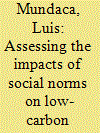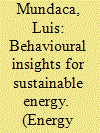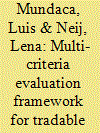|
|
|
Sort Order |
|
|
|
Items / Page
|
|
|
|
|
|
|
| Srl | Item |
| 1 |
ID:
183577


|
|
|
|
|
| Summary/Abstract |
Policymakers and scientists are paying increasing attention to how social norms can promote pro-environmental behaviour and sustainable energy use. We contribute to this field by experimenting with and assessing the impacts of social norms on low-carbon mobility options. Taking Sweden as a case study, we develop two complementary randomised controlled experiments to: 1) analyse the role of social norms in promoting the adoption of car sharing services (CSS) via descriptive and injunctive norms (N = 720); and 2) investigate potential crowd out effects when injunctive norms are used to promote a low-carbon transport hierarchy (N = 730). First-order effects show that social norms have a positive but marginal impact on the willingness to adopt CSS, and only injunctive norms have the potential to steer behaviour in the desired direction. Results also suggest that concerns about potential substitution effects between low-carbon transport options and CSS are not valid. With due limitations, our findings have various implications for policymaking, notably that for social norms to be effective, other policy instruments are critically needed. Of particular importance are the environmental effectiveness of CSS and complementarities between public transport and active mobility (i.e. walking and cycling).
|
|
|
|
|
|
|
|
|
|
|
|
|
|
|
|
| 2 |
ID:
187584


|
|
|
|
|
| Summary/Abstract |
Behavioural insights are increasingly shaping the design, implementation and evaluation of energy policies. This Special Issue aims to broaden and strengthen the evidence base, and policy value of behavioural insights in the context of sustainable energy use. It showcases a plethora of behavioural issues that can help to improve our understanding of the decision-making ‘black box’ of energy users and the contexts in which behaviours take place. Our editorial focuses on five cross-cutting themes, namely: interdisciplinarity, policy experimentation, non-economic factors, the diffusion of low-carbon innovations, and digitalisation. Findings across these themes reveal various challenges (e.g. timescales of energy behaviours, scaling of policy experiments, heterogeneous treatment effects) and four overarching areas are identified when policy implications are examined horizontally: ambition, integration, cooperation and ethics. We conclude that the application of behavioural insights to sustainable energy use provides a rich body of evidence and approaches to support our understanding of complex policy issues. It is an interdisciplinary and resource-intensive process that can effectively assist policymaking by encouraging behaviour change via more integrated, (cost-) effective interventions. Knowledge exchange between social scientists and policymakers is crucial for behavioural insights to realise their full potential. Ethical considerations call for good research practices and improved governance.
|
|
|
|
|
|
|
|
|
|
|
|
|
|
|
|
| 3 |
ID:
092764


|
|
|
|
|
| Publication |
2009.
|
| Summary/Abstract |
Recent years have witnessed regained political momentum on energy efficiency and interest in establishing markets is growing. As a result, Tradable White Certificate (TWC) schemes of differing design have been implemented in Great Britain, Italy and France. Much attention is being paid to justifying and evaluating such schemes. In this paper, we develop and apply a multi-criteria framework for evaluating TWC schemes-an approach that attempts to cover their individual design features. A broad evaluation is conducted regarding energy-saving and environmental effectiveness, economic efficiency, cost-effectiveness, transaction costs, political feasibility, administrative burden and technical change. The results show the design and performance of TWC schemes to be case and context-specific, and generalisations are thus inappropriate. This evaluation supports the cost-effectiveness modelled for the British scheme and the assumption that a TWC scheme is an economically efficient policy instrument. For the other, more complex TWC schemes, more data and experience are needed to judge their ex-post merit. On the whole, the proposed multi-criteria evaluation requires considerable data and complementary methods. However, the framework improves the understanding of the broad effects and attributes of TWC schemes. It deals with various empirical and normative aspects that can be applied in their evaluation.
|
|
|
|
|
|
|
|
|
|
|
|
|
|
|
|
|
|
|
|
|